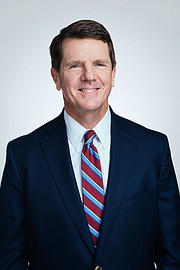Canceled events, deals months in the making that won't get done, down payments that people want back. The pandemic has snarled business and legal issues in novel ways that make the usual precedents all but useless.
"That romantic notion that you become an expert in a field and dispense that specialized and acquired knowledge is fanciful to start with, and this situation underscores that," says Jim Catanzaro, an attorney with Chambliss, Bahner & Stophel. "You're dealing with novel issues, adapting what you do in light of what your client needs. That's what good lawyering is."
There are about 1,200 attorneys in the Chattanooga area, and the odds are good that every one of them has had to figure out new ways of practicing to accommodate the demands of the pandemic, says Lynda Minks Hood, president of the Chattanooga Bar Association.
The association has overhauled its website to put COVID-19 resources front-and-center, including information about how the Tennessee Supreme Court is slowly lifting the limits on in-person court proceedings after months of closed courtrooms.
"We wanted to have everything on our website so the attorneys have everything they need," Hood says.
John Bode, an attorney who specializes in labor and employment law at Miller and Martin, compares helping his clients navigate the pandemic to charting a course through rough seas. The early, frantic days in March brought a barrage of questions from employers trying to figure out whether to retain or furlough employees, how to access aid money, and what to do about leave and sick pay questions.
"With the commencement of the pandemic, there was this swimming out and trying to get beyond the crashing waves," Bode says. "Now we're sort of beyond that, sort of riding the wave. Every wave I've been on, you come to recognize at some point it's going to crash."
The next phase will be assessing the potential impact of reopening, and what level of liability employers might have for the health of their employees or customers in an environment where the coronavirus is still spreading, Bode says.
"A lot of the employment community might be on pins and needles as to what the future might hold for them," he says. "This is going to be a longer-term issue, but the seas have been rough."
It will take some time for the legal landscape to become clear, and as the crisis evolves, so will the guidelines, Bode says.
"Some of the legislation that's coming out of the CARES (Coronavirus Aid, Relief, and Economic Security) act, there are hundreds of pages of guidelines, and it's not as if they've been the subject of study and assessment by scholars and judges and regulatory experts," he says. "One day the sentence reads this way, and two weeks later based on new guidance, the sentence is read a different way."
Whether it's the deposit on a block of 100 hotel rooms that will now sit empty, a speaker who insists on collecting the in-person fee for an event that will now be remote, or an acquisition where the buyer has cold feet, the words are everything, Catanzaro says.
"It depends on the language - the famous lawyer language," he says. "It's all about the contract."
The term 'force majeure' has long been standard-issue in legal contracts, but the words, which cover unforeseeable circumstances that prevent someone from fulfilling a contract, have taken on new significance,
"A lot of people - and I don't like this term - but they think of it as boilerplate," Catanzaro says. "It was not often a heavily negotiated clause."
In the pre-pandemic world, force majeure tended to cover localized events, such as weather disasters, Catanzaro says. Now, though, people are puzzling out how to phrase their contracts to incorporate an entirely new universe of possibilities.
"People right now, to the extent that they are drafting new contracts, they're absolutely trying to anticipate issues related to COVID-19," Catanzaro says. "All of our clients, in whatever way they're operating, they're dealing with COVID-related issues, so we are, too."
One issue Bode anticipates as businesses reopen and people return to work is the question of remote work, and whether employers will be pressed to accommodate it more.
"How that will turn into productivity and monitoring questions, making sure you've put in a fair day's work for a day's pay," Bode says.
The pandemic has also prompted people to plan for grim things they typically have put off thinking about, says attorney Colton Sadler, who has seen an uptick in people seeking help with wills and other end-of-life planning.
"People put off wills every day because they don't want to think of what happens after you pass away," Sadler says. "I think with this virus, everyone has time to sit down with their family and reflect."
While older people have been part of the increase, younger families have made up most of the growth in his planning clients, Sadler says.
"I've seen a huge increase in young families," he says. "People who have young children and are thinking about, who will take care of our children if we pass away?"
There's no playbook for this upending of nearly everything, and that means attorneys have to understand changes in guidelines and legalities on a nearly moment-to-moment basis to be able to advise their clients, says Alan Madison, an attorney at Miller and Martin.
"You go to law school, you get trained, and at some point, you feel like you have a pretty good handle on the way the world works, how transactions get done," Madison says. "Now things are changing every day, and you can't necessarily rely on what you learned five years ago because it no longer applies."
In his old life, Madison spent a lot of time working on debt finance or mergers and acquisitions for corporate clients. In recent months, however, he's become an expert on the constantly shifting financial resources businesses can tap to help them weather the pandemic, including the evolving rules around the Paycheck Protection Program.
"It is something you have to keep an eye on on an hourly basis," he says. "I cannot count the number of times I have refreshed the Treasury website to see if additional information has been posted."
There's no clear view of how this crisis will play out, or how it will affect legal issues in the long term, Madison says. Most of his clients have been trying to be flexible as they figure out how to press pause on some of the contracts that were in place when the pandemic shut down everything from restaurants and travel to schools and speaking events.
"I think that a lot of people in those positions have been pretty collaborative in their approach to dealing with the short-term impacts of the pandemic without a lot of acrimony," Madison says. "There are certainly exceptions, but the approach has been let's work together to get through these months."
A vaccine will be an important tipping point, but it does seem likely that clients will feel ready sooner than later to get back to business, Madison says.
"My sense is that there's not an appetite to sit around for a year-and-a-half and wait," he says. "Business people are looking for opportunities, and I think there are and will be many opportunities for creative business people to put together transactions well before there's a vaccine."
READ MORE
* (Won't) see you in court: Pandemic forces every element of the legal system to adapt in a hurry
* Record breaking: Hamilton County Juvenile Court leads the state in electronic conversion

